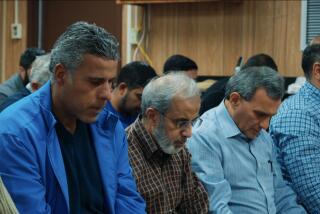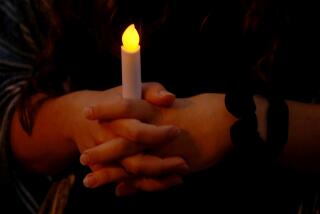Radical Imam Masri Convicted in Britain
- Share via
LONDON — Britain’s best-known Islamic militant, Abu Hamza al Masri, was found guilty Tuesday of encouraging murder and fomenting racial hatred and was sentenced to seven years in prison.
The imam of North London’s Finsbury Park Mosque from 1997 to 2003, Masri led a radical congregation that included convicted “shoe bomber” Richard Reid and Zacarias Moussaoui, who is facing trial in the U.S. in connection with the Sept. 11 conspiracy.
Masri, 47, also is wanted by the United States on terrorism charges. They include accusations that he helped arrange the abduction of foreign tourists in Yemen in 1998 and participated in a 1999 plan to open a terrorist training camp in Bly, Ore.
After serving time in Britain, he could face extradition to the United States. His defense lawyer said Masri intended to appeal his conviction and fight extradition.
A naturalized British citizen who came to the country in 1979, Masri emerged as a militant preacher in the 1990s. He was followed, recorded and filmed for years by police assigned to track militant Islamists, but he was not charged with a crime in Britain until five months after the U.S. indictment was announced in May 2004.
The decision to prosecute Masri marked a turning point in Britain’s treatment of Islamic militancy. For years, authorities tolerated them but kept a watchful eye on suspects’ activities. That approach was criticized after the Sept. 11 attacks and further questions emerged after last summer’s suicide bombings on London’s transit system.
When the charges did come, they focused on his speeches and sermons over the years at the mosque and its meeting rooms and on materials seized at his home in West London.
A jury found Masri guilty on 11 counts: six of solicitation to murder; three of using threatening words and behavior with intent to foment racial hatred; one of possessing audiotapes intended to stir up racial hatred; and one of possessing an “Encyclopedia of Afghani Jihad,” which prosecutors described as a terrorist manual dedicated to Osama bin Laden. One chapter listed likely targets such as the Statue of Liberty, the Eiffel Tower and Big Ben.
Masri was found innocent of four charges: three of solicitation to murder and one of threatening behavior.
Criminal court Judge Anthony Hughes said that in spite of Masri’s claims, he did not represent the religion of Islam and his teachings had caused “incalculable” damage.
“You ... helped create an atmosphere in which to kill has come to be regarded by some as not only a legitimate course but as a religious duty in the pursuit of perceived justice,” he told Masri, who sat impassively, before imposing the sentence.
“You spoke with considerable authority and apparent learning to audiences who treated you as entitled and qualified by your learning to tell them what their Islamic duty was,” the judge said. “You spoke with great anger directed at virtually every country and against large numbers of people who you labeled as less than true believers.”
Hughes added: “You are entitled to your views in this country and to express them -- up to the point where you incite murder and racial hatred. That is what you did.”
As Masri was being led away, a sympathizer in the public gallery shouted, “God bless you, Sheik Hamza!”
A tall, thickset man in a turban with prosthetic hooks for hands and a fake eye, Masri had become a tabloid boogeyman even before his arrest.
A police raid on Finsbury Park Mosque in 2003 netted gas pistols, a stun gun, knives, protective suits, gas masks, radios, stolen passports, laminating equipment, credit cards and cash.
Eventually Masri was barred from preaching at the mosque. He began holding Friday services in the street outside.
Mainstream Muslims pointed out that his following was small, with only scores of regular attendees. But Masri still managed to garner wide attention with such events as his one-year anniversary celebration of the Sept. 11 attacks.
It has not been established how close Masri may have been to Bin Laden, although he has been accused of sending followers to Al Qaeda training camps in Afghanistan.
Masri’s attorney, Muddassar Arani, said after the verdict that Masri had never intended harm to the British people and merely had been exercising his right to express his opinions.
She said he urged Britons to take control of the government’s foreign policy, “which results in bloodshed and loss of innocent ... lives abroad.” Despite the verdict, she said, he was content with his fate.
“Sheik Abu Hamza wishes to thank God almighty for what has been decreed for him. We may have lost one battle, but there are many more to be fought,” she said.
She also said he would be fighting extradition to the United States, claiming that evidence in the Oregon case comes from a discredited witness.
Born Mustafa Kamel Mustafa in Alexandria, Egypt, Masri came to Britain as a student and worked briefly as a bouncer. He was briefly married to a British woman, which enabled him to obtain British citizenship.
According to Masri’s account of his life, he went to Afghanistan in the late 1980s to take part in Islamic guerrillas’ war against the Soviet military presence, and it was in that campaign that he lost his hands and eye in an explosion.
More to Read
Sign up for Essential California
The most important California stories and recommendations in your inbox every morning.
You may occasionally receive promotional content from the Los Angeles Times.










